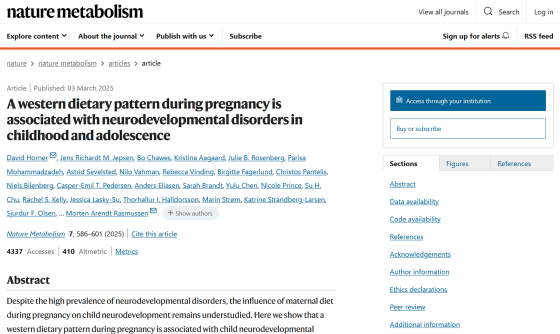Mothers' diet during pregnancy may affect their children's risk of ADHD

It is known that maternal alcohol consumption and smoking during pregnancy can have a negative impact on fetal development. A new study has found that a pregnant woman's diet may affect the risk of her child
A western dietary pattern during pregnancy is associated with neurodevelopmental disorders in childhood and adolescence | Nature Metabolism
https://www.nature.com/articles/s42255-025-01230-z

New Research: Strong Link Between Western Diet During Pregnancy and ADHD – University of Copenhagen
https://science.ku.dk/english/press/news/2025/new-research-strong-link-between-western-diet-during-pregnancy-and-adhd/
Maternal Diet in Pregnancy Linked to Children's Risk of Future Disorders : ScienceAlert
https://www.sciencealert.com/maternal-diet-in-pregnancy-linked-to-childs-risk-of-future-disorders
In recent years, research into neurodevelopmental disorders in children, including ADHD, and their risk factors has progressed, but there has been little research into the impact of pregnant women's diet on neurodevelopmental disorders in their children.
A research team from the University of Copenhagen in Denmark and other institutions used data from four large-scale studies conducted in Denmark and the United States to analyze the relationship between pregnant women's diets and their children's neurodevelopmental disorders.
In total, more than 60,000 mother-child pairs participated in the study, and the data included information on the mother's dietary patterns during pregnancy, blood samples, and the child's ADHD diagnosis. The mother's blood samples were collected at various times during pregnancy, and the research team analyzed the mother's metabolic products through metabolomics to look for metabolites that may affect the outcome.

The analysis found that all four studies found a link between pregnant women's Western diet and an increased risk of ADHD in children. For example, even a slight shift in dietary habits to a Western diet increased the risk of ADHD by 66%. One study also reported a link between pregnant women's Western diet and autism in children.
'The more Westernized a diet is during pregnancy - high in fat, sugar and refined products and low in fish, vegetables and fruit - the higher the risk of having a child with ADHD and autism,' said lead author Dr David Horner, a food scientist at the University of Copenhagen.
In this study, a 'Western diet' is defined as a pattern in which people eat more of the foods shown in red in the graph below and less of the foods shown in green. Foods that are common in Western diets include 'Animal fats,' 'Refined grains,' 'High energy drinks,' 'Spices,' 'High fat dairy,' 'Snacks,' and 'Red meat.' On the other hand, foods that are not included in the Western diet include 'Fruit,' 'Fish,' 'Tomatoes,' 'Water,' and 'Green leafy vegetables.'

The study also confirmed that the association between diet and ADHD risk was strongest during the first to second trimester of pregnancy. 'Comparing between cohorts, the strongest associations were observed during the first and second trimesters of pregnancy, suggesting that fetal brain development during this period is particularly sensitive to maternal nutrition,' said co-author Professor Morten Arendt Rasmussen of the University of Copenhagen.
In addition, metabolomics analysis of blood samples revealed 43 metabolites that may explain the association between diet and neurodevelopmental disorders. Of these 43 metabolites, 15 were found to be particularly strongly associated with an increased risk of ADHD. Many of these were related to diet and played important roles in regulating inflammation and oxidative stress, which are important for early neurodevelopment.
While the findings of this study may cause concern to many, they also show that small improvements in diet can have a positive impact on children's brain development. 'Our analysis not only confirmed the strong association between diet and ADHD risk, but also identified nutrients and foods that could serve as the basis for improved dietary guidelines and prevention strategies. This opens up new possibilities for improving dietary recommendations and making future generations healthier,' said Horner.
Related Posts:







